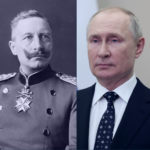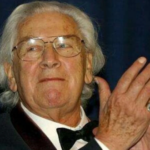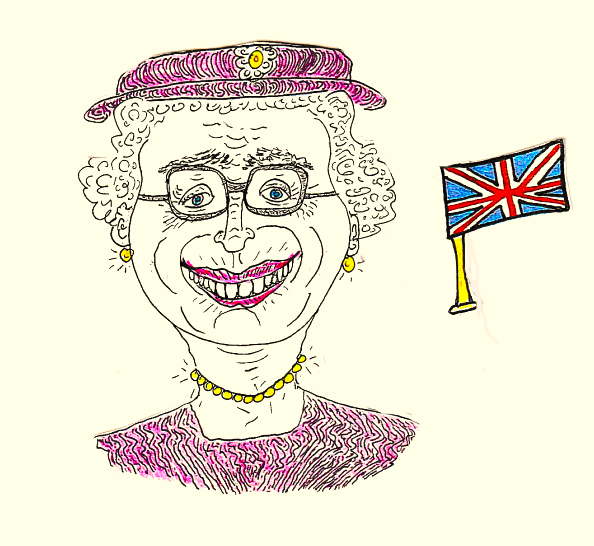Picture: ” Long Live Our Noble Queen,” A Cartoon By Lorenzo Cherin
Elizabeth R, the symbol of the Monarch and of the Crown, is one that is instantly recognisable. The R, Latin for Regina, meaning, Queen! Thus would the first Queen Elizabeth make an immediate visual impact as who she was, on paper, or perhaps more appropriately then, on parchment. The signature of that first Elizabeth,was as visually flamboyant as the name was immediately obvious.
Of course, Elizabeth R is as appropriate in usage, for the second of the name to occupy the throne, as for the first. And indeed there are many similarities. Elizabeth the First fascinates yet. From Bette Davis to Flora Robson, from Glenda Jackson to Cate Blanchet, the subject of inummerable films, dramas, or documentaries, lectures and books, is going strong! I have always had great interest in Elizabeth the First, since, as a boy who loved films and was interested in history, I also discovered I shared the same birthday.
But the delight in Elizabeth the Second, perhaps elicits an altogether different response. Not so much, a sense of formality, with a need for Elizabeth R, as a sense of familiarity, with a nod and ” Elizabeth, ah!” Such is the affection for the world’s longest reigning Monarch! No modern monarchy, and no individual monarch within it, can compare to those of old. The power that once went with the role, is no more. And yet, there lies the same mystery, but revealed better than ever. For once the monarch was flattered at best and feared at worst. Now, without power that comes from its being absolute, Queen Elizabeth has the power that comes from our being affectionate. So the monarch is loved at best and liked at worst. The remarkable thing about this present incumbent is she has, more than most, truly given of her best.
The seventy years of the Jubilee now being celebrated, has for anyone interested in combatting prejudice,which is the purpose of our Forum and the reason for its being founded, seen a chnge in attitudes that have nearly all been for the better. In 1952, the United Kingdom was dominated by class, and, if inequality is less a preocupation now, and more of an issue than it should be, it is based on circumstances of failings in economics, and governments, more than circumstances of structures of class and lineages.
The United Kingdom of 1952, was only just opening up to multiracial immigration, and though it had alread been, for a few years, host to new communities from previous British Empire Dominions, the sense of Britishness was based on a loyalty to a “mother” country, not a place of birth and a sense of inclusion fully. Now the United Kingdom is a genuinely multiracial society. A mere glimpse of the composition in ethnicity, of the members of the crowd celebrating this Jubilee, reveals the extent of this success story. The naysayers can trot out the negative talking points, but the black, white, brown Great Britons, talking from the crowds to presenters interviewing for programmes on UK television, show the truth. The black and brown citizens, in their comments, as keen and eloquent as any could be who could have traced their being British far further back, in origins. Those of us like me, of part recent immigrant origin, also in my case mixed with an older British lineage, understand there is no inconsistency, and feel and share the feelings of loyalty.
There is an obvious appeal to nearly everyone, of a family so known to nearly everyone. Even if the knowledge of them is imagined more than it is experienced directly, the experience is as great and significant and as genuine, for each who experiences it. Whatever has and does divide a country and tear it apart, has not done so in Britain. The Brexit division, the pandemic confusion, has led to a Jubilee celebration! And this period of seventy years has seen the racism sometimes present in people’s attitudes, become a multiracial community much more at ease with itself than many.
Prime Minister, Margaret Thatcher is supposed to have said of the Queen, privately, “She is the sort of woman who would probably vote, SDP!” This comment was made at a time when the SDP, a new Social Democratic Party, joining forces with the traditional Liberal Party, was trying to build the centre ground in a UK and world political climate that was increasingly polarised and divided. Whether it was true of the Queen, who is not allowed to vote anyway, is pure conjecture. What Thatcher, if she said it, might have been suggesting, is that the Queen is a moderate, a consensus builder, a bridge across divides. I have always described her as my country’s Diplomat-In-Chief, Ambassador-At-Large.
The greatest testimony to that approach is a tribute to her and the best of the post war history of Britain and the wider world. For an Empire that had seen Britain for over a hundred years become THE world super power, shed itself as such and did so with very little violence. The gradual but definite independence, sought and given, by and to the ex- Empire nations, took place in the years before and mainly during, the reign of Elizabeth the Second. What was once a thriving Empire based on what for many had come to be felt at times as a stranglehold in a colony, became a thriving Commonwealth based on what over many decades has grown into an organisation with a sense of international community. Queen Elizabeth is Queen of Great Britain, Northern Ireland, and Head of the Commonwealth. And some members of that Commonwealth, not least, Canada, Australia and New Zealand, even to this day, retain the Queen as Head of State. It is in her carrying out of her duties to and within, the countries of the Commonwealth, that the absence of prejudice, has been and is, so evident, in this individual person who is Queen. Never a patronising comment, no sense of a holier than thou attitude. Always at ease with herself and others.
When the Queen signed the legislation in recent years, that made into law, the acceptance of gay marriage, she is said to have said, ” isn’t it marvellous!” Whether she did or didn’t, just like the party political comments in previous speculation, from Thatcher, we can relate to the idea of it. It says a lot about her, that whether she said something or not, we have the sense of what she might feel reflecting the sort of person she is. There is in this woman, an innate decency and respect, that breaks down barriers that often lead to prejudice, even if from other sides of barriers that are based on class or wealth. Nobody can say that the United Kingdom has a common wealth, even if it has led the Commonwealth. But it is comfort to know that across the divides of race, gender, orientation and identity, the Britain of today as a nation, that this Head of State is at the Head of, is comfortable with itself with regard to much, that tears apart other nations.
There are many Britons who do not engage in the celebrations of the Jubilees of the Queen. This was ever thus. Revelry for these is not possible if it is about royalty. What they do not understand is those of us who do celebrate do so because we feel, “What’s not to like?!” The UK Royaly Family, as an istitution, is less expensive than the US Presidency and the French Presidency. And whereas these figures often polarise, even where they do not mean to, so the system of Constitutional Monarchy, unites, as it is meant to. It is an anachronism, perhaps. But it is apt, for a country known for eccentricity! Where party politics has as powerful a place as any, in the UK, so too, its absence, in its Contitutional Monarchy, places, not power into the hands of one person, above people, but rather, a role into the hands of one personality, beyond politics. There is far more to the celebratory aspect of the Monarchy than any celebrity aspect of it. The Queen, ably joined by other senior members of the Royal Family, contributes real dedication and effort, on behalf of charities and communities, throughout the UK realm and the wider international world. It is the real sense of public service, this adds to the genuine level of public response.
Queen Elizabeth the First reigned, more or less absolutely and better than many, as proof even then that absolute power doesn’t always corrupt absolutely. She ushered in and presided over an era known as the Elizabethan Age. This Renaissance in the arts and culture and all that happened in that period of forty five years, was remarkable for that era. Queen Elizabeth the Second, has reigned in an altogether different era. There is no real comparison. The remarkable celebration of this monarch happening this year and especially this weekend, is as much about, the age of Elizabeth, as it is the Age of Elizabeth. To be going strong as she is, well up in her nineties, is truly remarkable. It says a lot about the need to continue to value those with much to offer at an advanced age, for one of the forms of prejudice too acceptable, is prejudice against old age. But Queen Elizabeth has presided over an era that can indeed be called the Second Elizabethan Age. It has been and is an era in which an old country became newer in ways few do. Peacefully, gradually, pleasantly. Ways a little like the lady herself. It has, for the country she has led, been a little like it was for that lady, when she turned twenty one, and spoke to the country to which she was pledged. It is a coming of age.
Author Profile
Latest entries
 Ustinov Prejudice Awareness ForumJanuary 12, 2024Paying Pipers
Ustinov Prejudice Awareness ForumJanuary 12, 2024Paying Pipers Ustinov Prejudice Awareness ForumJanuary 12, 2024The Warmongers
Ustinov Prejudice Awareness ForumJanuary 12, 2024The Warmongers Ustinov Prejudice Awareness ForumJanuary 12, 2024With Thanks
Ustinov Prejudice Awareness ForumJanuary 12, 2024With Thanks Ustinov Prejudice Awareness ForumJanuary 12, 2024Sir Sidney
Ustinov Prejudice Awareness ForumJanuary 12, 2024Sir Sidney

